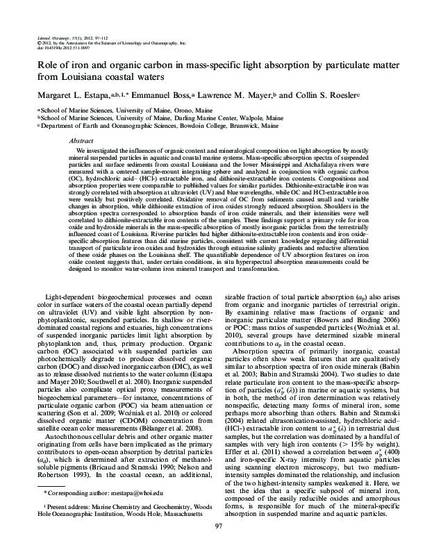
We investigated the influences of organic content and mineralogical composition on light absorption by mostly mineral suspended particles in aquatic and coastal marine systems. Mass-specific absorption spectra of suspended particles and surface sediments from coastal Louisiana and the lower Mississippi and Atchafalaya rivers were measured with a centered sample-mount integrating sphere and analyzed in conjunction with organic carbon (OC), hydrochloric acid– (HCl-) extractable iron, and dithionite-extractable iron contents. Compositions and absorption properties were comparable to published values for similar particles. Dithionite-extractable iron was strongly correlated with absorption at ultraviolet (UV) and blue wavelengths, while OC and HCl-extractable iron were weakly but positively correlated. Oxidative removal of OC from sediments caused small and variable changes in absorption, while dithionite extraction of iron oxides strongly reduced absorption. Shoulders in the absorption spectra corresponded to absorption bands of iron oxide minerals, and their intensities were well correlated to dithionite-extractable iron contents of the samples. These findings support a primary role for iron oxide and hydroxide minerals in the mass-specific absorption of mostly inorganic particles from the terrestrially influenced coast of Louisiana. Riverine particles had higher dithionite-extractable iron contents and iron oxide–specific absorption features than did marine particles, consistent with current knowledge regarding differential transport of particulate iron oxides and hydroxides through estuarine salinity gradients and reductive alteration of these oxide phases on the Louisiana shelf. The quantifiable dependence of UV absorption features on iron oxide content suggests that, under certain conditions, in situ hyperspectral absorption measurements could be designed to monitor water-column iron mineral transport and transformation.
